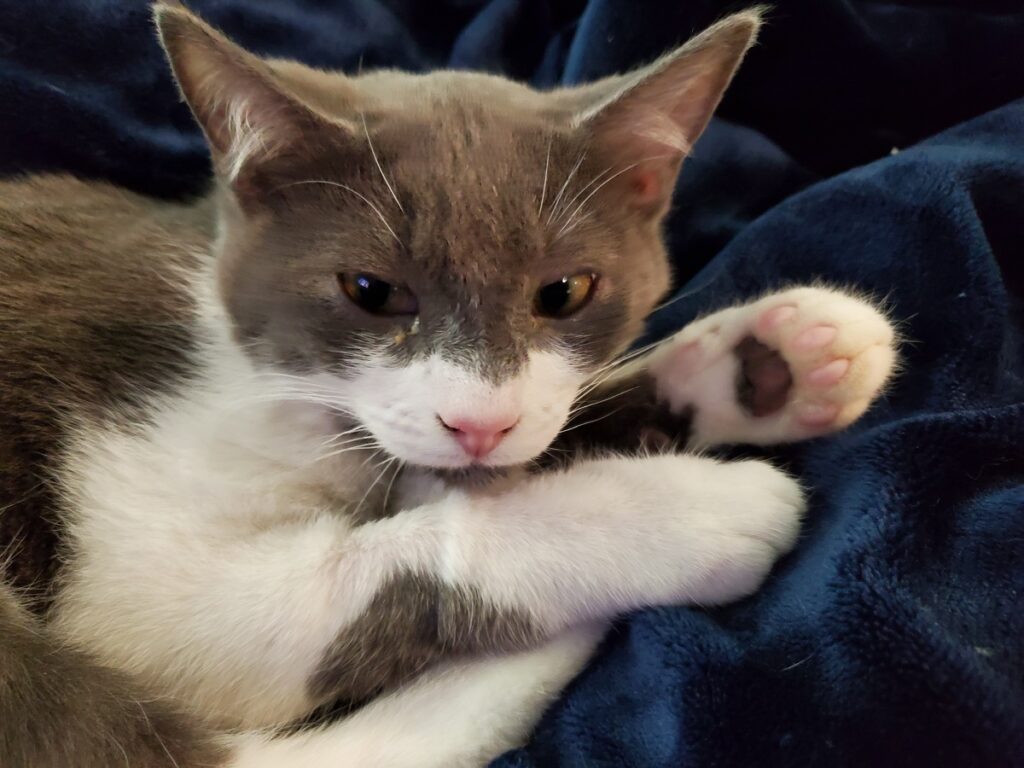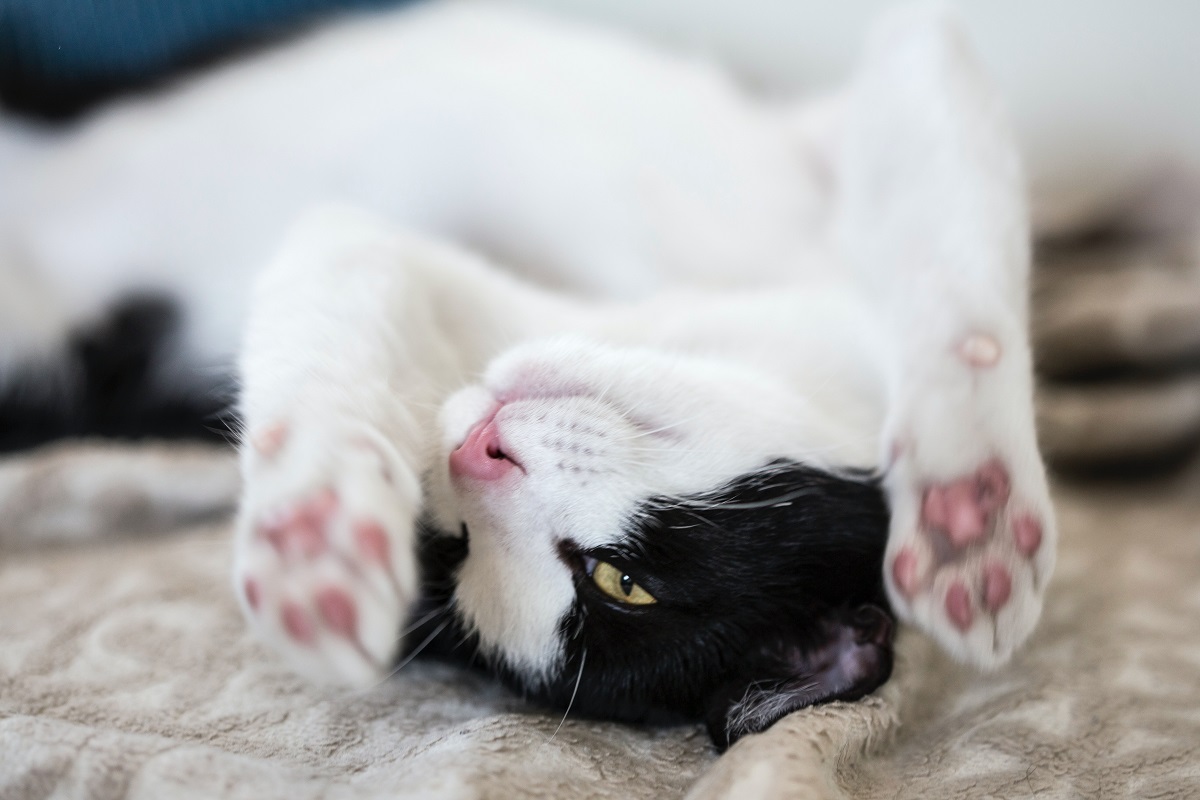One moment your cat is peacefully grooming, and the next, he’s spinning in circles like a furry tornado, trying to bite the tail that’s been there all along. When a cat suddenly starts attacking his own tail, it’s not just random silliness. There’s always a reason behind it even if that reason is “I’m bored and feel like fighting something I can’t escape.”
This behavior can range from totally harmless to a sign of something more serious. It depends on how often it happens, how intense it is, and whether it’s a new development or just part of your cat’s quirky personality.
Let’s unpack what might be going on when your cat goes after his own tail, what’s normal, and when it’s time to get a professional opinion.
A Little Tail-Chasing Is Normal
It’s worth noting that not all tail-attacking is cause for concern. Just like a dog might chase its tail out of boredom or excitement, cats will sometimes go after their own tail during play, especially younger cats or those with a lot of energy.
You might notice:
- A playful pounce
- A quick bite or bat at the tail
- A few spins before going back to whatever they were doing
If this happens occasionally, with no signs of distress or aggression, it’s probably just part of your cat’s normal routine. Think of it like shadowboxing with a built-in toy.
When Tail-Attacking Becomes a Red Flag
If the behavior is new, happens frequently, or seems aggressive, it may be more than just fun and games. Sudden tail-chasing and biting can signal stress, discomfort, or a medical issue.
Here are a few possible explanations:
1. Fleas or skin irritation
Fleas love to hide at the base of the tail, and an infestation can cause intense itching and frustration. Your cat may suddenly go after their tail as a way to scratch or bite at the area. Even a small number of fleas can drive your cat up the wall.
2. Allergies or dermatitis
Food allergies, contact irritants, or environmental allergies can cause inflammation in the skin and tail area. If your cat is obsessively licking or biting at their tail, look for signs of redness, hair loss, or flaky skin.
3. Pain or injury
A pulled muscle, bite wound, or tail trauma can cause sharp or lingering pain that makes your cat lash out. Cats often don’t show pain in obvious ways, but a tail that is constantly being attacked might be sending a signal that something hurts.
4. Feline hyperesthesia syndrome (FHS)
This is a neurological condition that can cause sudden bouts of twitching, biting at the tail, pupil dilation, and restlessness. It’s sometimes described as “rippling skin disorder” and often appears out of nowhere. FHS is rare, but real, and often misinterpreted as aggression or play.
5. Stress and anxiety
If your cat is feeling overwhelmed or under-stimulated, tail-chasing may become an outlet for pent-up energy or nervous tension. Environmental changes, loud noises, new pets, or boredom can all contribute.
How to Tell If It’s Medical or Behavioral
It can be tricky to know whether the behavior is play-based or something that needs a vet’s attention. Here are a few clues:
Signs it’s probably medical:
- Sudden onset, especially in an adult cat
- Hair loss, scabs, or wounds on the tail
- Tail sensitivity or flinching when touched
- Dilated pupils, muscle twitching, or vocalizing during episodes
- The behavior interrupts normal activities like eating or grooming
Signs it’s probably behavioral:
- Happens during or after play
- No signs of injury or discomfort
- No hair loss or redness
- Tail biting stops when distracted
- It looks more like mischief than misery
If you’re unsure, it’s always best to talk to your vet. They can help you rule out medical causes before addressing any behavioral ones.

Alas, there it is! That mysterious, furry, wiggly thing is following me around again. Every time I try to catch it, it slips away. It dares me to catch it. Keep mocking me, oh wiggly nemesis, keep mocking me. See what happens! I’ll pounce, swat, and show you who’s boss. #WigglyNemesis #IveGotThisUnderControl #WhoNeedsToysWhenYouHaveATail
Joey
What You Can Do at Home
If your cat’s tail-attacking seems playful or mild, you can take a few simple steps to redirect the behavior.
Offer more stimulation
Cats who are bored are more likely to turn on their own tails. Add puzzle feeders, climbing spaces, or interactive toys to help burn off extra energy.
Stick to a consistent routine
Cats thrive on structure. Feeding, playtime, and attention at regular intervals can reduce anxiety and help your cat feel secure.
Avoid punishment
Yelling or physically stopping your cat from biting their tail can increase stress and make the behavior worse. Instead, use redirection; try tossing a toy or engaging them in another activity.
Groom regularly
Brush your cat often to remove loose fur and check for any signs of fleas, skin irritation, or lumps near the tail.
Use calming aids if needed
In cases of anxiety, calming sprays, pheromone diffusers, or supplements can help reduce nervous energy and self-directed behaviors.
When to Call the Vet
If your cat is attacking their tail frequently, seems distressed, or is causing injury to themselves, it’s time to involve your veterinarian.
They can check for:
- Parasites
- Allergies
- Neurological conditions
- Pain or injury
- Behavioral concerns
The sooner you get to the root of the issue, the sooner your cat can get back to peacefully ignoring their tail like a normal cat.
Final Thoughts: When Tail Biting Is More Than a Quirk
Your cat attacking his own tail might be playful, stress-related, or medical, and the key is figuring out which. While an occasional tail chase is harmless fun, repeated or aggressive biting deserves a closer look.
Watch for other symptoms, stay curious, and trust your gut. Cats are mysterious, but they always have a reason. Even if that reason is “I saw something move and decided it was suspicious.”
Sources:
Understanding Feline Hyperesthesia https://www.petmd.com/cat/conditions/neurological/feline-hyperesthesia-syndrome
Cat Tail Behavior Explained https://www.icatcare.org/advice/cat-tail-language
Parasites and Skin Conditions in Cats https://vcahospitals.com/know-your-pet/flea-allergy-dermatitis-in-cats
Stress and Behavior in Cats https://www.humanesociety.org/resources/cats-and-stress
Recent Posts
Your Cat Might Be a Furry Little Healer… or at Least a Fuzzy Alarm System If you’ve ever had your cat suddenly become extra clingy when you’re under the weather, you’re not alone. From...
Cats are experts at hiding things, socks under furniture, their disdain for your playlist, and, unfortunately, symptoms of illness. In the wild, showing weakness could make them a target, so even...


